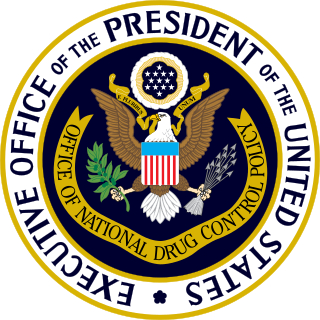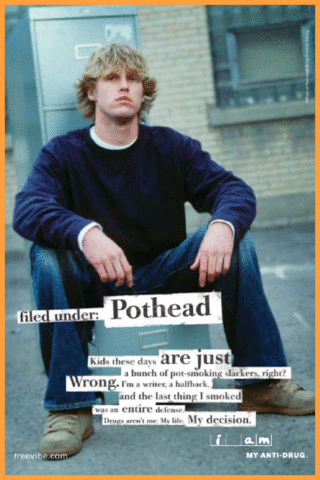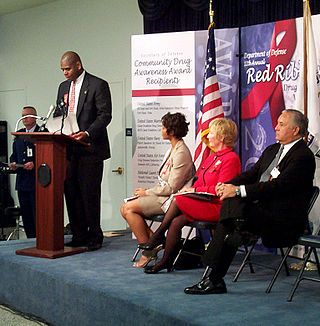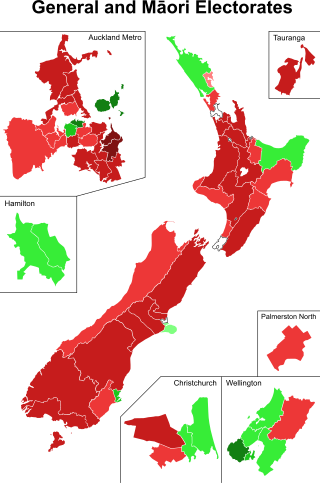
The prohibition of drugs through sumptuary legislation or religious law is a common means of attempting to prevent the recreational use of certain intoxicating substances.

The Office of National Drug Control Policy (ONDCP) is a component of the Executive Office of the President of the United States.

Drug Abuse Resistance Education, or D.A.R.E., is an American education program that tries to prevent use of controlled drugs, membership in gangs, and violent behavior. It was founded in Los Angeles in 1983 as a joint initiative of then-LAPD chief Daryl Gates and the Los Angeles Unified School District as a demand-side drug control strategy of the American War on Drugs.
Commonly-cited arguments for and against the prohibition of drugs include the following:

Nicotine marketing is the marketing of nicotine-containing products or use. Traditionally, the tobacco industry markets cigarette smoking, but it is increasingly marketing other products, such as electronic cigarettes and heated tobacco products. Products are marketed through social media, stealth marketing, mass media, and sponsorship. Expenditures on nicotine marketing are in the tens of billions a year; in the US alone, spending was over US$1 million per hour in 2016; in 2003, per-capita marketing spending was $290 per adult smoker, or $45 per inhabitant. Nicotine marketing is increasingly regulated; some forms of nicotine advertising are banned in many countries. The World Health Organization recommends a complete tobacco advertising ban.
Truth is an American public-relations campaign aimed at reducing teen smoking in the United States. It is conducted by the Truth Initiative and funded primarily by money obtained from the tobacco industry under the terms of the 1998 Master Settlement Agreement reached between 46 U.S. states and the four largest companies in the tobacco industry.
Above the Influence originated as a government-based campaign of the National Youth Anti-Drug Media Campaign conducted by the Office of National Drug Control Policy in the United States that included broad messaging to focus on substances most abused by teens, intended to deliver both broad prevention messaging at the national level and more targeted efforts at the local community level.

Cannabis culture describes a social atmosphere or series of associated social behaviors that depend heavily upon cannabis consumption, particularly as an entheogen, recreational drug and medicine.
"420" is the 12th episode in the seventh season of the American animated television series Family Guy. It premiered on Fox in the United States on April 19, 2009. The title of the episode is a reference to the term "420" used in cannabis culture; "420" premiered on bicycle day, April 19, the day before April 20 (4/20), on which a counterculture holiday is celebrated centering on the consumption of cannabis. "420" focuses on the character Brian after he is arrested for drug possession, which prompts him to launch a campaign to legalize cannabis with help from Stewie; the liveliness of their campaign convinces Mayor West to legalize the drug, and most of Quahog's population begins using it.

In Colorado, cannabis has been legal for medical use since 2000 and for recreational use since late 2012. On November 7, 2000, 54% of Colorado voters approved Amendment 20, which amended the State Constitution to allow the use of marijuana in the state for approved patients with written medical consent. Under this law, patients may possess up to 2 ounces (57 g) of medical marijuana and may cultivate no more than six marijuana plants. Patients who were caught with more than this in their possession could argue "affirmative defense of medical necessity" but were not protected under state law with the rights of those who stayed within the guidelines set forth by the state. The Colorado Amendment 64, which was passed by voters on November 6, 2012, led to recreational legalization in December 2012 and state-licensed retail sales in January 2014. The policy has led to cannabis tourism. There are two sets of policies in Colorado relating to cannabis use: those for medicinal cannabis and for recreational drug use along with a third set of rules governing hemp.

Smokingamong youth and adolescents is an issue that affects countries worldwide. While the extent to which smoking is viewed as a negative health behavior may vary across different nations, it remains an issue regardless of how it is perceived by different societies. The United States has taken numerous measures, ranging from changes in national policy surrounding youth cigarette access to changes in media campaigns, in attempts to eliminate the use of tobacco products among teenagers. Approximately 90% of smokers begin smoking prior to the age of 18.

The National Youth Anti-Drug Media Campaign is a current US government health education campaign by the Office of National Drug Control Policy (ONDCP) within the Executive Office of the President of the United States with the goal to "influence the attitudes of the public and the news media with respect to drug abuse" and of "reducing and preventing drug abuse among young people in the United States".

Partnership to End Addiction, formerly called The Partnership for a Drug Free America, is a non-profit organization aiming to prevent the misuse of illegal drugs. The organization is most widely known for its TV ad This Is Your Brain on Drugs.

Minors and the legality of cannabis is one of the issues around the legalisation of cannabis, with most jurisdictions placing strict age limits in a similar way as is done with the drinking age for alcohol.

Cannabis rights or marijuana rights are individual civil rights that vary by jurisdiction. The rights of people who consume cannabis include the right to be free from employment discrimination and housing discrimination.

The 2020 New Zealand cannabis referendum was a non-binding referendum held on 17 October 2020 in conjunction with the 2020 general election and a euthanasia referendum, on the question of whether to legalise the sale, use, possession and production of recreational cannabis. It was rejected by New Zealand voters. The form of the referendum was a vote for or against the proposed "Cannabis Legalisation and Control Bill". Official results were released by the Electoral Commission on 6 November 2020 with 50.7% of voters opposing the legalisation and 48.4% in support.
The cannabis policy of the Reagan administration involved affirmation of the War on Drugs, government funded anti-cannabis media campaigns, expanded funding for law enforcement, involvement of the U.S. military in interdiction and eradication, reduction in emphasis in drug treatment, and creation of new Federal powers to test employees and seize cannabis-related assets.
"Nothing Happens", also called "Nothing can happen to you, too", or "Marijuana can make nothing happen to you, too", was an anti-cannabis public service announcement created by the United States Office of National Drug Control Policy (ONDCP).
Electronic cigarettes are marketed to smoking and non-smoking men, women, and children as being safer than cigarettes. In the 2010s, large tobacco businesses accelerated their marketing spending on vape products, similar to the strategies traditional cigarette companies used in the 1950s and 1960s.












